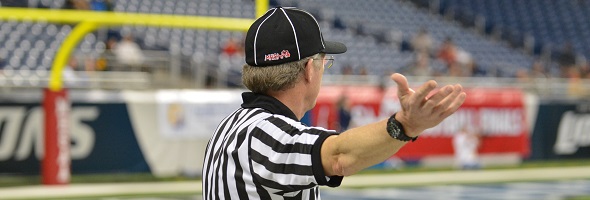
Be the Referee: Play Clock Experiment
September 1, 2016
This week, MHSAA assistant director Mark Uyl explains the 40-second game clock Michigan football schools are allowed to try this fall.
Be The Referee is a series of short messages designed to help educate people on the rules of different sports, to help them better understand the art of officiating, and to recruit officials.
Below is this week's segment – Play Clock Experiment - Listen
From time to time, the MHSAA receives permission from the national rules making body, the National Federation of State High School Associations, to experiment with a new rule.
This fall in high school football, Michigan schools can experiment with a 40-second play clock. In this experiment, the 40-second play clock begins at the end of the previous play, giving teams consistency from week to week when the offense can next snap the ball.
With using the traditional 25-second play clock, it really depends on the referee of the game in terms of the pace on how quickly the offenses can go.
Past editions
Aug. 25: Clipping in the Free Blocking Zone - Listen

Be the Referee: Other Football Changes
September 7, 2017
This week, MHSAA assistant director Mark Uyl discusses a few final football rules in the final of a three-part series on changes in the sport for this fall.
Be The Referee is a series of short messages designed to help educate people on the rules of different sports, to help them better understand the art of officiating, and to recruit officials.
Below is this week's segment – Other Football Rules Changes - Listen
Today in our final segment of a three-part series on the football rules changes for the 2017 season, we’re going to be looking at three items:
• On passing plays, pass interference will no longer be called when the defender is simply face guarding the receiver with no contact.
• In the final two minutes of a half, the team accepting a penalty will now have the option of restarting the game clock with the snap of the ball, rather than the referee’s ready-for-play signal.
• This is the second year of an experiment in Michigan with a 40- second play clock, which starts shortly after a play is over, replacing the 25-second play clock which was always started by the referee marking the ball ready for play.
Past editions
August 31: Pop-Up Onside Kicks - Listen
August 24: Blindside Blocks - Listen

